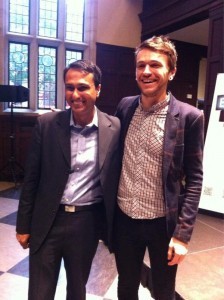Finding Common Ground With ‘Sacred Ground’
 On my last day of work at Interfaith Youth Core, I had lunch with its founder, Eboo Patel. As we ate I told him that, inspired by his book “Acts of Faith,” I was going to write a book of my own about atheism and interfaith work.
On my last day of work at Interfaith Youth Core, I had lunch with its founder, Eboo Patel. As we ate I told him that, inspired by his book “Acts of Faith,” I was going to write a book of my own about atheism and interfaith work.
“Yeah?” he replied, grinning and taking a bite of his sandwich. “When?”
“Oh,” I offered, realizing I hadn’t actually thought about details. “Someday…”
“When?” he said again.
“In five years? Maybe 10?”
He thought for a second, then said, “Why not start now?”
I chewed on my sub, and on his question. Why not now? I came up with several reasons immediately: I’m young; I like to write but have little formal training; I’m really young. But I swallowed those thoughts and said: “Sure. Why not? I’ll start writing and see what happens.”
As soon as I started writing, I couldn’t stop. Before I knew it I had a book contract, and then a finished book. (My book, “Faitheist,” will be released Nov. 6 and is available for preorder.)
While I was writing, so was Eboo. I got a copy of his excellent new book, “Sacred Ground” — a vital, urgent exploration of America’s dark history of both prejudice toward religious minorities but also its principled promise of religious liberty — a few weeks ago. When I read the chapter on interfaith leadership, where he describes some of the journey I share in “Faitheist,” I was moved.
A story about an atheist in a book like “Sacred Ground” is good for atheists; it demonstrates that we have a unique contribution to make to America’s diverse religious landscape. And it will promote the idea of atheists as largely goodhearted people who want the same things most Americans do to people who might believe otherwise — people whose perceptions of atheists are based on caricature rather than meaningful relationships.
Storytelling can do that. It can connect and inspire us to new ways of thinking, to greater empathy and to increased familiarity with different experiences, identities and values.
I thought more about the power of narrative as I followed the news cycle last Sunday with a broken heart, when a white gunman stalked into a Sikh temple in Wisconsin and shot and killed six people and wounded several others. I surveyed reactions to the shooting and found they were significantly more muted than the response to the Aurora tragedy several weeks before. Perhaps people are becoming more accustomed to awful, violent outbursts such as this, but I wonder if the reactions don’t say something about the way we see “others” in this country.
Continue reading at The Huffington Post, Beacon Broadside, or IFYC.



